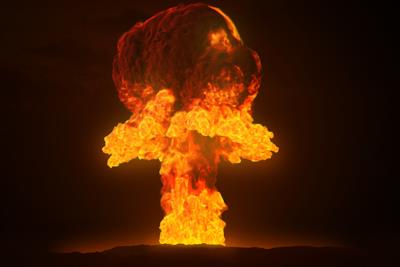PDF chapter test TRY NOW
14. When the Nazis came to power in Germany in 1933, Einstein emigrated to the United States. Five years later, the discovery of nuclear fission in Berlin had American physicists in an uproar. Many of them had fled from Fascism, just as Einstein had, and now they were afraid the Nazis could build and use an atomic bomb.
15. At the urging of a colleague, Einstein wrote a letter to the American President, Franklin D. Roosevelt, on 2 August 1939, in which he warned: “A single bomb of this type . . . exploded in a port, might very well destroy the whole port together with some of the surrounding territory.” His words did not fail to have an effect. The Americans developed the atomic bomb in a secret project of their own, and dropped it on the Japanese cities of Hiroshima and Nagasaki in August 1945.
16. Einstein was deeply shaken by the extent of the destruction. This time he wrote a public missive to the United Nations. In it he proposed the formation of a world government. Unlike the letter to Roosevelt, this one made no impact. But over the next decade, Einstein got ever more involved in politics — agitating for an end to the arms buildup and using his popularity to campaign for peace and democracy.
17. When Einstein died in 1955 at the age of 76, he was celebrated as a visionary and world citizen as much as a scientific genius.
17. When Einstein died in 1955 at the age of 76, he was celebrated as a visionary and world citizen as much as a scientific genius.
Explanation:
When the National Socialist Party member, led by Adolf Hitler, came to power in Germany in 1933, Einstein left Germany and relocated to the United States of America. After five years, the Germans discovered nuclear fission. The reaction in which the nucleus of an atom separates into two or more smaller nuclei is known as Nuclear fission. The discovery of nuclear fission was carried out in Berlin. Due to this, all the scientists in America were upset and scared. The reason behind the fear was that the Germans might misuse the technology by manufacturing an atomic bomb. Many of them, including Einstein, feared for their life because they had to run away from Germany (homeland) due to Fascism. Fascism is a political system where the state or country is controlled by a powerful leader who rarely accepts any political disagreement.
After noticing the problem, a colleague spoke about it with Albert Einstein. As a result of his advice, he wrote a letter to Franklin D. Roosevelt, the American President. The letter was written on 2nd August 1939. The message stated if one of these bombs exploded near any port, the areas and the nearby lands would be destroyed entirely. Einstein's letter had made an effect on Franklin D. Roosevelt. The Americans then began secretly developing the atomic bomb. Finally, they dropped it on two cities in Japan: Hiroshima and Nagasaki, in August 1945.
After noticing the problem, a colleague spoke about it with Albert Einstein. As a result of his advice, he wrote a letter to Franklin D. Roosevelt, the American President. The letter was written on 2nd August 1939. The message stated if one of these bombs exploded near any port, the areas and the nearby lands would be destroyed entirely. Einstein's letter had made an effect on Franklin D. Roosevelt. The Americans then began secretly developing the atomic bomb. Finally, they dropped it on two cities in Japan: Hiroshima and Nagasaki, in August 1945.

Atom bomb nuclear explosion*
Einstein was shocked by seeing the vast destruction. Later, Einstein penned an official letter to the United Nations. Albert Einstein advocated the formation of a world government, but the letter had no effect. However, over the next decade, Einstein became increasingly involved in politics, advocating for an end to the manufacturing and usage of weapons. Also, he fought for international peace and democracy, and his principal goals were world peace and human liberty. When Albert Einstein died in 1955 at the age of 76, the world hailed him as a visionary and global citizen, as much as they had celebrated him as a scientist.
Einstein was shocked by seeing the vast destruction. Later, Einstein penned an official letter to the United Nations. Albert Einstein advocated the formation of a world government, but the letter had no effect. However, over the next decade, Einstein became increasingly involved in politics, advocating for an end to the manufacturing and usage of weapons. Also, he fought for international peace and democracy, and his principal goals were world peace and human liberty. When Albert Einstein died in 1955 at the age of 76, the world hailed him as a visionary and global citizen, as much as they had celebrated him as a scientist.
Meanings of the difficult words:
| S.No | Words | Meanings |
1 | Emigrate | Leave one's own country to settle permanently in another |
2 | Uproar | Very upset |
3 | Territory | An area of land under the jurisdiction of a ruler or state |
4 | Drop | Having fallen or been allowed to fall vertically |
5 | Campaign | An organised course of action to achieve a goal |
6 | Democracy | The belief in freedom and equality between people, or a system of government based on this belief, in which power is either held by elected representatives or directly by the people themselves |
Reference:
- National Council of Educational Research and Training (2006). Beehive. A Truly Beautiful Thing (pp. 46-53). Published at the Publication Division by the Secretary, National Council of Educational Research and Training, Sri Aurobindo Marg, New Delhi.
- Atom bomb nuclear explosion*: Burnt Pineapple Productions, CC0, via Wikimedia Commons.
